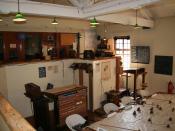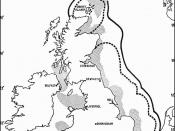Silence, nothing but silence until there's a buzz in the air, slowly getting louder, then suddenly dozens of bombers fly over cities and towns destroying everything in sight, without a single plane launching to defend the homeland. This is how many air raids were carried out through World War I because the only defenses to air attacks were hearing and eyesight. The invention that would change everything was radar, which was created in the years preceding World War II. The British would end up relying on their, at the time, advanced radar system to avoid any disasters caused by the Germans who greatly outnumbered them. The British won the Battle of Britain because of the advantage they had with the most important tactical and technological advancement of World War II, known as radar.
Workings of Radar The creation of the radar gave an early advantage to the British. In previous wars, such as World War I, the only warning soldiers could get of an attack was by their own hearing and eyesight (Lu online).
Radar would end up making air attacks harder to complete in secrecy because planes could be detected miles away. Scientists first started looking into the idea of what is now known as radar because "as far back as June 1932, there had been reports about a plane interfering with radio signals, and re-radiating them" (Lu online), or sending them back to where they came from.
The British had an early start in radar research because of their scientists. Sir Robert A. Watson-Watt, a British electronics genius who had already invented the stereo with two speakers, and his staff, A.F. Wilkens, came up with the idea of "RDF", which stood for Radio Direction Finding (Lu online). RDF got the name "radar" as a codename. Radar is an...


